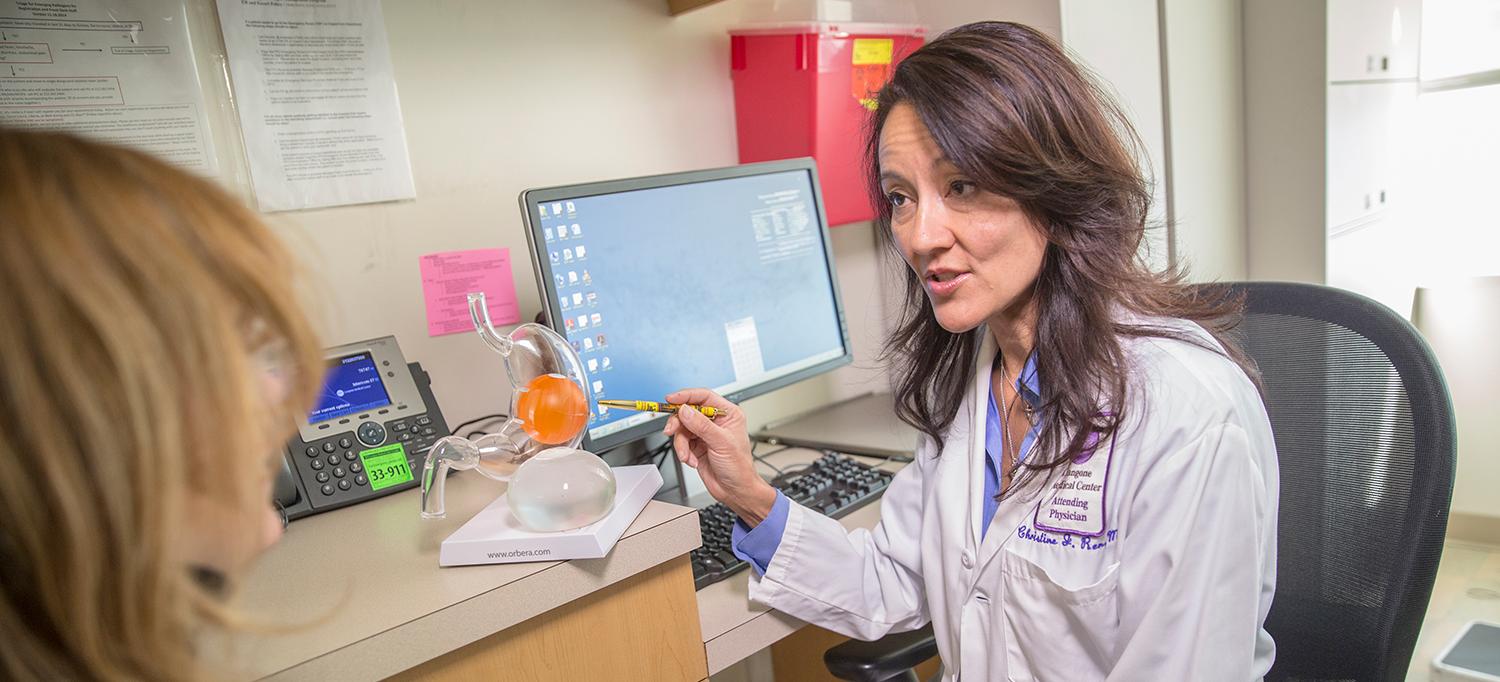
Dr. Christine Ren-Fielding, director of the Division of Bariatric Surgery, estimates that about 80 percent of patients who undergo minimally invasive weight loss procedures report long-term success.
Photo: Andrew Neary & Adam Watt
Some 75 percent of men and 67 percent of women in the US are overweight or obese. It’s no wonder, given the numerous factors working against us. “We’re genetically programmed to defend against weight loss,” explains Steven Lamm, MD, medical director of NYU Langone's Preston Robert Tisch Center for Men’s Health. “Many people have inherited genes that promote being overweight. On top of that, cheap, calorie-dense, but nutrient-deficient food is readily available to everyone. Stress, sedentary lifestyles, and sleep problems add to the risk. It’s a perfect storm for weight gain.”
Dr. Lamm is part of a multidisciplinary team of experts at NYU Langone who treat obesity not as a side effect of unhealthy lifestyle choices but rather as a complex chronic disease requiring personalized care and long-term oversight. “Overweight people lose weight all the time,” notes Dr. Lamm, “but they rarely achieve an optimal weight, and 95 percent of the time, they regain the weight they’ve lost.”
Diet and exercise are necessary components, but for many, they’re not enough. NYU Langone’s comprehensive approach offers a medically proven alternative. The idea is to target weight loss from every angle, offering a full spectrum of treatments that includes nutritional counseling, behavioral therapy, medical management, and bariatric surgery.
Here, NYU Langone experts share five key insights that help their patients lose weight and keep it off for good.
1. Slow and Steady Wins the Race
Holly Lofton, MD, an internist board-certified in obesity medicine, is director of NYU Langone’s Medical Weight Management Program. “I’m your physician for life,” she tells her patients.“That’s why we call it weight management, not weight loss.”
Dr. Lofton’s most effective approach is a medically supervised meal replacement plan she describes as “safe, healthy, and tasty.” It limits daily intake to about 1,100 calories, including very few carbohydrates and fats. “The balance of protein and carbs makes you feel full in a way regular food never could,” she explains. This approach works by depleting the body’s store of carbohydrates, forcing it to burn fat while naturally suppressing appetite. The result is a steady weight loss of three to five pounds per week. In a field where failure is the norm, Dr. Lofton can claim remarkable success. Some 85 percent of her patients hit their target weight without surgery.
2. Pinpoint the Root of the Problem
Sometimes, simply removing a barrier, such as not being able to sleep well, is enough to kick-start the weight loss process, explains Dr. Lamm. A shift worker or someone who has to travel often for business may have circadian dysregulation. This disruption of the sleep-wake cycle, he explains, often leads to weight gain. “In these cases, it’s not about a low-carb diet. You’ve got to fix the sleep problem,” he says.
Psychological issues also play a major role, notes psychiatrist Diane Klein, MD, director of NYU Langone’s Eating Disorders Program. “This can include negative self-talk, where people expect themselves to fail. They may have tried a number of diets and not succeeded. Other factors, such as stress or emotional eating, can also make it hard to stick to a plan.” Dr. Klein emphasizes that cognitive behavioral therapy can be very effective in addressing negative patterns of thinking.
3. For Substantial Weight Loss, Consider Minimally Invasive Surgery
Bariatric surgical procedures can help prevent, slow the progression of, or even reverse certain obesity-related conditions by restricting the size of the stomach. Certified as a Center of Excellence by the American College of Surgeons and the American Society for Metabolic and Bariatric Surgery, NYU Langone’s Medical Weight Management Program performs some 1,000 of these procedures annually. Christine Ren-Fielding, MD, director of the Division of Bariatric Surgery, estimates that about 80 percent of these patients report long-term success. Her husband, George Fielding, MD, the J. Ira and Nicki Harris Family Professor of Surgery and Bariatric Medicine, pioneered the laparoscopic technique now used to place an adjustable gastric band around the upper portion of the stomach. NYU Langone is also among the first training centers in the country to teach the newly FDA-approved non-invasive intragastric balloon procedure, in which a soft silicone balloon is inserted endoscopically into the stomach. The balloon is filled with saline solution to make you feel full.
4. Where You Live Matters
Social scientists increasingly point to the “food environment” as a factor in America’s obesity epidemic. In neighborhoods with low-income levels, healthful food is actually hard to find, while junk-food options are plentiful. To understand how such variables affect a community’s residents, health economist Brian Elbel, PhD, a member of NYU Langone’s Department of Population Health, is leading an unprecedented study of New York City’s 1.1 million public school students. Using data provided by the city and state, his team is tracing changes in each student’s body mass index, or BMI, year by year, and relating those statistics to information about the types of restaurants and food markets near the child’s home and school. “Cities have begun taking measures meant to fight obesity, such as restricting fast-food outlets, without knowing which policies are effective,” explains Dr. Elbel. “Our research will help determine what really works.”
5. Minimize Antibiotic Exposure
Recent research indicates that bacteria lining the gastrointestinal tract may play an important role in maintaining a healthy weight. This population of microorganisms, known as the gut microbiome, breaks down many proteins, carbohydrates, and fats that we would otherwise be unable to process. Gastroenterologist Ilseung Cho, MD, a member of NYU Langone’s Department of Medicine, led a study showing that mice given low doses of antibiotics developed 10 to 15 percent more fat than a control group. Their modified microbiomes, the study showed, were allowing them to absorb more calories. These results, says Dr. Cho, not only make a case for eating antibiotic-free meat, but point to potential treatments for obesity. “The hope,” he explains, “is that we might be able to improve someone’s metabolism by altering their microbiome.”

